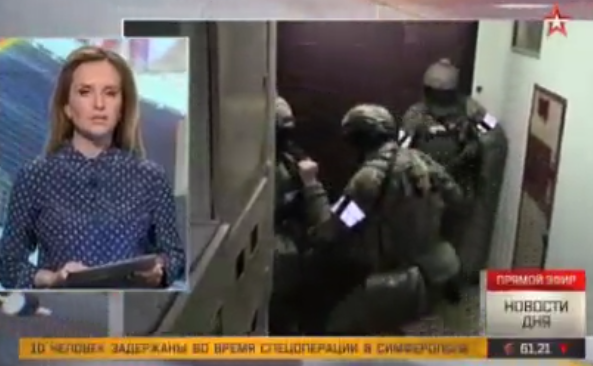Russia uses hate speech to stir up fear and hatred of Ukrainians in occupied Crimea

Russia is deliberately creating an atmosphere of fear and aggression in occupied Crimea with Ukraine and Ukrainians pitched as ‘the enemy’. This is the main conclusion of a monitoring assessment of Russian and Crimean media undertaken by the Crimean Human Rights Group and Human Rights Information Centre. Since Russia’s invasion and occupation of Crimea have been recognized (by the International Criminal Court) as an international armed conflict, it is legitimate to consider such deliberate incitement to hatred to be one of Russia’s weapons of war.
Although other groups, such as LGBT people were also targeted, the hate speech was primarily directed against Ukrainians in general – both as a people and as a political community, against Crimean Tatars, Muslims, migrants, as well as Euromaidan activists. Its effect was exacerbated by the overall absence of free and independent media in occupied Crimea.
The authors monitored the evening news broadcasts on the main Russian TV channels available in occupied Crimea (Rossiya 1; NTV; and Pyervy Kanal) during the Spring of 2014 (soon after Russia’s annexation) and in the Spring of 2017. They also analysed the content of websites of Crimean media and the ‘official’ occupation authority websites from March to October 2014 and from January to July 2017.
Iryna Sedova, one of the authors, stresses that this is deliberate policy by the occupation regime. By creating an atmosphere of hatred and fear in Crimea, they hope to ensure that nobody dares speak out in support of Ukraine, and to further push Crimeans to join the Russian army. As reported, Russia’s imposition of conscription and militarization on occupied territory, including education, pushing military service, are in flagrant breach of international law and essentially constitute a war crime.
By constantly inciting hatred towards Ukrainians as a whole, towards Crimean Tatars or Muslims, the Russian occupiers are creating an atmosphere in which crimes against members of these groups are inevitable. Sedova notes that such incitement was one of the factors leading to the genocide in Rwanda. She warns that “Russia is constantly throwing dynamite into the fire”.
Such hate speech also makes it easier for Russia to try to justify its repression against the above-mentioned groups.
It should be said that pro-Russian media in Crimea were guilty of such hate speech long before Russia’s invasion, with publications, like Krymskaya Pravda frequently publishing texts that particularly incited hatred and distrust of Crimean Tatars. It was certainly not state policy, however, whereas the inflammatory material that the researchers found was not only on Russian state-controlled TV channels, but also on the occupation regime’s official websites and even in legal documents.
718 examples of hate speech were identified, with the vast majority (479) found in the news broadcasts of Russian TV channels and directed against Ukrainians in general, or those living in government-controlled Ukraine.
The resources monitored referred to inhabitants of occupied Donbas – the Kremlin-backed ‘Donetsk and Luhansk people’s republics’ as being a “separate people”, and to Crimeans as being ‘Russians’.
The authors call on Ukraine’s Crimean Prosecutor’s Office to initiate criminal proceedings against those guilty of such incitement. They stress that the material contained in their report can be used as confirmation of ethnic discrimination for Ukraine’s court case against Russia at the UN’s International Court of Justice at the Hague.
A lot of the examples cited by the authors from 2014 were also used by Russia to support its military aggression against Ukraine in Donbas. There too, the Russian and Russian-backed militants cut off all Ukrainian channels as soon as they seized control, with Russian state channels immediately placed on air.
Russian TV propaganda pushed the image of Ukrainians as “fascists, Nazis” and claimed them to be “monsters who committed bestial murders of their compatriots”.
Worth noting that back in 2015, four ex-employees of mainstream Russian channels provided detailed information about the Kremlin instructions for such state-dictated warmongering and hate speech.
One of the journalists explained that the top management had meetings at the Kremlin, after which presenters were instructed on which terms to use, like ‘junta’, ‘fascist’ ‘Bandera supporters’ etc. The authors of the Crimean report give examples of the constant use of the term каратели. Literally this means ‘punishers’, but it is, they note, a heavily weighted and negative term, used after the Second World War by the Soviet media, and even after the collapse of the USSR, to refer to the atrocities committed by SS battalions and other war criminals prosecuted at the Nuremberg Trials.
Another typical narrative was that used by Russia to distort the tragic disturbances and fire in Odesa on May 2, 2014, and treat it as a ‘massacre’.
Although the number of examples of hate speech specifically targeting Ukrainians had significantly fallen by the second monitoring period in 2017, the overall level of hate speech remained the same, with new targets added.
In light of the alarming warnings presented in this analysis regarding the danger of such incitement, it is worth remembering that the same methods were also seen in Kremlin-funded media broadcast or published abroad. Russia Today, or RT, has consistently pushed the same false narrative about a non-existent ‘massacre’ in Odesa. There is no question here, or in its use of other lies, that RT is not aware that it is misleading its audience since it regularly selects only the few damning quotes from the international reports which totally reject the ‘massacre’ claims.
The report can be found in Russian here
Язык вражды в информационном пространстве Крыма





